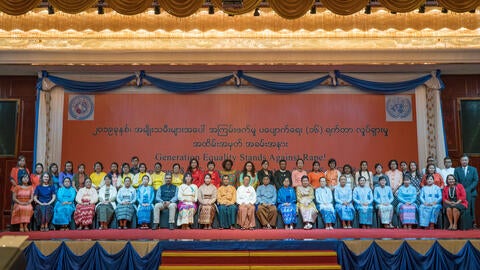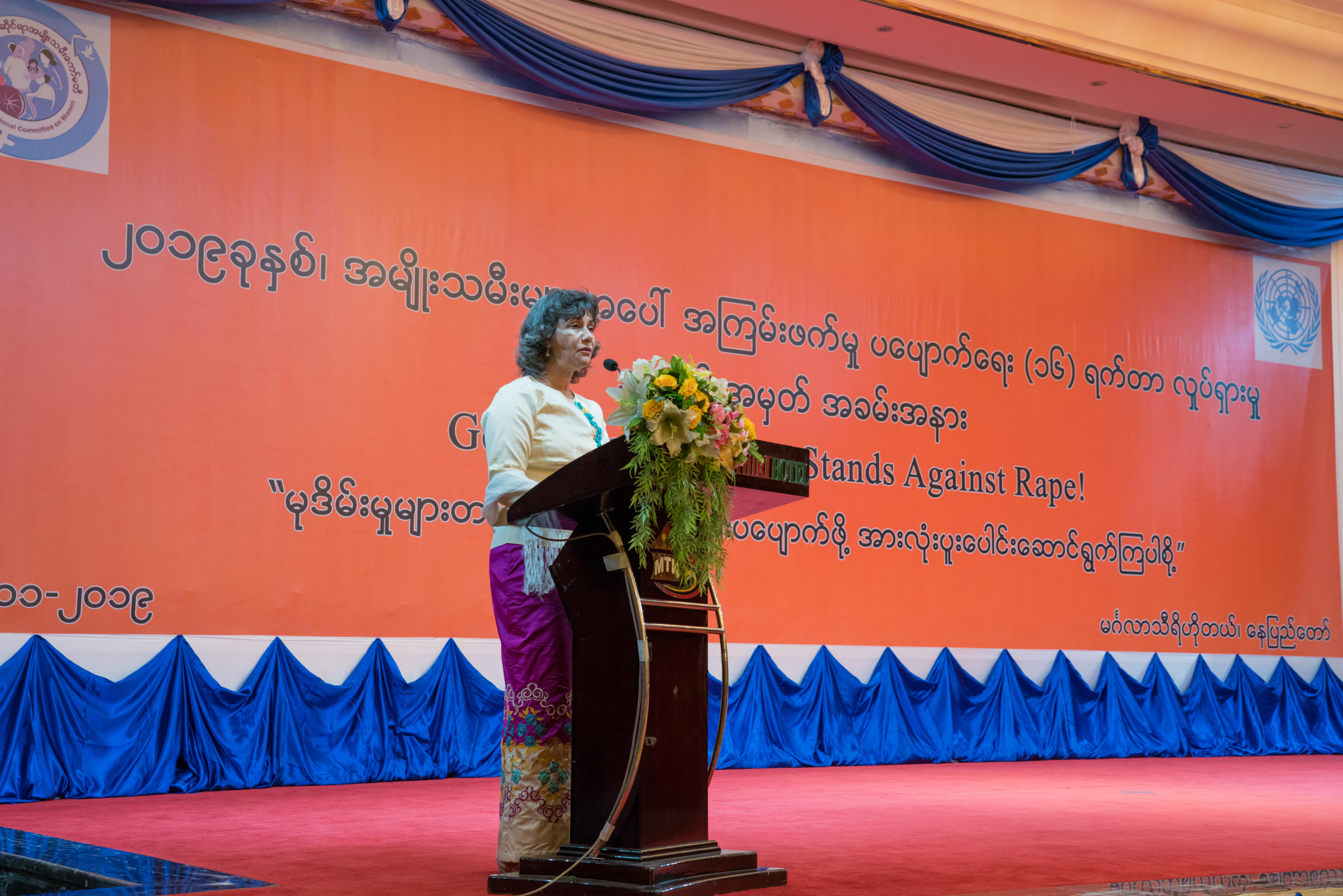NAY PYI TAW, Myanmar – On 25 November 2019, a national level ceremony on 16 Days of Activism against Gender-based Violence was held in Nay Pyi Taw under 2019 Theme “Generation Equality: Stands Against Rape”. Jointly organized by Myanmar National Committee on Women and UNFPA, the event was held at Mingalar Thiri Hotel.
The ceremony was attended by U Soe Aung, Deputy Union Minister for Social Welfare, Relief and Resettlement; Ms. Nelida Rodrigues, UNFPA Deputy Representative for Myanmar. Also in attendance were the parliamentarians, and representatives from government departments, civil society organizations, international development partners, UN agencies and civil society organizations in Myanmar.
Speech delivered by Ms. Nelida Rodrigues, UNFPA Deputy Representative for Myanmar
Your Excellency U Soe Aung, Deputy Union Minister of the Ministry of Social Welfare, Relief and Resettlement;
Honourable Guests;
Representatives from the line ministries and civil society organizations;
International development partners, UN Colleagues and media representatives;
Ladies and gentlemen;
A very good morning to you all,
On behalf of the United Nations in Myanmar, I am delighted to join this important event to mark the first day of the 16 days of activism against gender-based violence. The theme of this year is “Generation Equality Stands Against Rape!”.
Gender-based violence is widespread, persistent and devastating. Globally, one in three women is subjected to violence at some point in their lives. In every country in the world, gender-based violence remains as unsolved social issue and not a single country in the world has managed to eradicate violence. Myanmar is not an exception, and gender-based violence is pervasive across the country, and the risks increase especially in the humanitarian contexts.
Gender-based violence is a violation of human rights in itself and directly affects the ability of women and girls to enjoy their rights. Violence against women and girls prevent them from participating in public life and in the political, social and economic development of the country. It also constitutes a barrier for the access by women and girls to essential services, including health, sexual and reproductive health, as well as social protection and justice.
Ladies and gentlemen,
Everyone has a right to live free of violence and dignity. It is a fundamental right – a right enshrined in international human rights law through the Convention on the Elimination of All Forms of Discrimination Against Women; the Beijing Platform for Action; and the ASEAN Declaration on the Elimination of Violence Against Women and Children.
The right to live free from violence includes the right to live free from sexual violence and rape, which is the main theme of this year’s 16 days of activism campaign. A vast majority of these cases still go unreported. Survivors are left wounded, invisible and suffering in silence, and impunity is perpetuated.
Worldwide, the topic of sexual violence is usually considered culturally sensitive to discuss in public, particularly because prejudices against survivors of sexual violence run deep. Survivors of sexual violence are blamed for being abused, and are stigmatized as morally loose women, so they keep silence.
There is often resistance to address sexual violence because challenging sexual harassment and violence raises questions about cultural norms and gender stereotypes. These are difficult conversations which need to take place at all levels from community to policy levels.
People tend to assume that sexual violence only occurs outside of family and is caused by strangers, while in fact this is not the case. Many women are unsafe in their own homes. They can be harassed, abused, raped or sexually coerced by their own husband and other family members. For girls and women to talk about this is even more difficult.
The key aspect of sexual violence whether it happens in public or private domain is the lack of consent and inherent unequal power relationship between perpetrator and survivor. Thus, in order to protect women and girls from rape and all forms of sexual violence, we need to ensure that they are able to exercise their free will and informed consent.
As long as women in every part of the world, including Myanmar, are still suffering from gender discrimination and gender-based violence, Sustainable Development Goals will not be achieved. Women and girls should not be “left behind” from being part of and contributing towards peaceful, prosperous and equal future.
In this respect, I would like to acknowledge the efforts by the Government of Myanmar to promote gender equality and address gender-based violence in partnership with civil society organizations, development partners and the United Nations. The Government’s commitment towards the implementation of the National Strategic Plan for the Advancement of Women, the establishment of Violence against Women Technical Working Group with participation from diverse stakeholders, and the finalization of case management Standard Operating Procedures are some of such examples.
Nonetheless, the work is still unfinished. If women live in daily fear of their safety and security, they are less likely to be able to participate fully in public life, and cannot contribute to the important processes, such as, peace and reconciliation, addressing climate change, or bringing sustainable development to the country.
We need to put in place the overall legal framework to effectively address issues indicated above in a comprehensive and coordinated manner. For this, it is important to enact the Protection and Prevention of Violence against Women law and other gender-responsive legislations. This is crucial to be able to hold perpetrators of violence accountable. Such legislation must be in compliance with the Convention on the Elimination of All Forms of Discrimination Against Women.
There is an urgent need for a safe environment for survivors of violence to break the silence and seek justice. There is an urgent need to provide quality, multi-sectoral services based on survivor-centered approach, including health care, justice, safety, protection and social services to women and girls who have experienced violence. This is particularly urgent for the most vulnerable groups, including ethnic minority women, women and girls affected by conflict and displacement, LGBTIQ, and those living with disabilities. In addition, there is a need for solid and reliable data on gender-based violence to inform advocacy, policy development and service delivery.
Furthermore, efforts to prevent gender-based violence are also critical in order to address the root causes through risk mitigation, social norm change, enhancement of women’s and girls’ agency, and strengthening of legal and justice systems to end impunity.
The UN in Myanmar remains firmly committed to supporting the Government and civil society partners to realize advancement of gender equality, the rights and empowerment of women and girls and elimination of all forms of gender-based violence. Together, we can build a future Myanmar free from violence. We need to join hands to break our silence and take action to stop violence against women and girls and stop rape.
Distinguished guests,
Before concluding, I would like to acknowledge the leading role of the Ministry of Social Welfare, Relief and Resettlement to organize this national high level event. I would also like to acknowledge the active participation of ministries and agencies at the central and local levels. I would like to thank members of the Myanmar National Committee on Women, Gender Equality Network, UN Gender Theme Group, GBV Coordination Working Group, all development partners, Embassies, UN Agencies, and media for their support to make this campaign possible.
I look forward to the in-depth policy discussion this morning, as part of our efforts to eliminate this pandemic of violence against women and girls in all its forms.
Thank you very much for your attention and participation. I wish you every success during the 16 days of activism.

Violence in Nay Pyi Taw Photo: UNFPA Myanmar


